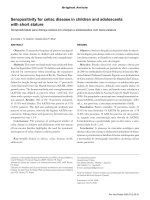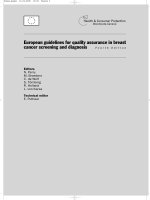TACKLING CHRONIC DISEASE IN EUROPE: Strategies, interventions and challenges pot
Bạn đang xem bản rút gọn của tài liệu. Xem và tải ngay bản đầy đủ của tài liệu tại đây (790.33 KB, 127 trang )
on Health Systems and Policies
European
Reinhard Busse, Miriam Blümel,
David Scheller-Kreinsen,
Annette Zentner
Observatory Studies Series N
o
20
TACKLING CHRONIC
DISEASE IN EUROPE
Strategies, interventions and challenges
Tackling chronic disease in Europe
Tackling chronic disease
in Europe
Strategies, interventions and
challenges
Reinhard Busse
Miriam Blümel
David Scheller-Kreinsen
Annette Zentner
Keywords:
© World Health Organization 2010, on behalf of the European Observatory on Health
Systems and Policies
Contents
Acknowledgements vii
List of tables, figures and boxes ix
List of abbreviations xi
About the authors xiii
Chapter 1 Introduction 1
Part I: Burden of chronic disease
Chapter 2 Deaths and burden of chronic disease in Europe 9
2.1 Current status 9
2.2 Predictions 17
Chapter 3 Economic consequences of chronic disease 19
3.1 The microeconomic perspective 19
3.2 The macroeconomic perspective 24
Part II: Strategies for tackling chronic disease
Chapter 4 Strategies against chronic disease: what is being done? 27
4.1 Prevention and early detection 27
4.2 New provider qualifications and settings 31
4.3 Coordinating care for individual chronic diseases: DMPs 34
4.4 Managing care across chronic diseases: integrated care models 36
Chapter 5 Effectiveness of strategies against chronic disease 39
5.1 Prevention and early detection 39
5.2 New provider qualifications and settings 40
5.3 Coordinating care for individual chronic diseases: DMPs 41
5.4 Managing care across chronic diseases: integrated care models 45
Chapter 6 Costeffectiveness of strategies against chronic disease 49
6.1 Prevention and early detection 49
6.2 New provider qualifications and settings 51
6.3 Coordinating care for individual chronic diseases: DMPs 51
6.4 Managing care across chronic diseases: integrated care models 52
Part III: Challenges of chronic disease management
Chapter 7 Tackling the challenges of chronic disease in Europe 55
7.1 New pharmaceuticals and medical devices 55
7.2 Financial incentives 59
7.3 Improving coordination 67
7.4 Information and communication technology 75
7.5 Evaluation culture 79
Chapter 8 Conclusions 85
References 91
vi
Tackling chronic disease in Europe
Acknowledgements
Securing
Europe’s Healthcare Future: Chronic Disease Management and Health Technology
Assessment (2009)
Tables
Table 2.1 Disease burden and deaths from noncommunicable
diseases in the WHO European Region by cause (2005)
10
Table 2.2 Deaths and burden of disease attributable to common risk
factors, in absolute numbers and percentages of all deaths/
DALYs, by contribution to worldwide deaths (2001)
12
Table 3.1 Impact of chronic diseases and conditions and risk
factors on labour supply, selected examples
20−21
Table 3.2 Impact of chronic diseases and conditions and risk
factors on wages, earnings or incomes, selected examples
21−23
Table 4.1 Population goals for nutrients and features of lifestyle
consistent with the prevention of major public health
problems in Europe
29
Table 4.2 DMP participants in Germany according to indication
(2008)
35
Table 5.1 Effects of antismoking measures on smoker prevalence 40
Table 5.2 Summary of evidence for various disease management
programme outcomes, by disease
43
Table 5.3 Findings from studies of large-scale, population-based
disease management programmes
44
Table 5.4 Summary of evidence on effectiveness of CCM
components
46
Table 6.1 Cost per QALY saved by interventions to reduce or
prevent obesity
50
Table 7.1 Personalized medicine 58
List of tables,
figures and boxes
- x -
Table 7.2 Incentives used to improve chronic care in European
countries
63
Table 7.3 Recent policy initiatives to improve coordination and
quality of chronic care
72–73
Table 7.4 Evidence of effectiveness: clinical decision support system
(CDSS)
77–78
Figures
Fig. 1.1 Structure of the book 2
Fig. 2.1 Worldwide share of deaths by causes and countries within
different World Bank income categories (2002)
11
Fig. 2.2 Burden of death and disease attributable to stroke in
selected countries in the WHO European Region (2004)
14
Fig. 2.3 Burden of death and disease attributable to diabetes in
selected countries in the WHO European Region (2004)
14
Fig. 2.4 Burden of death and disease attributable to COPD in
selected countries in the WHO European Region (2004)
15
Fig. 2.5 Burden of disease attributable to unipolar depressive disorder
in selected countries in the WHO European Region (2004)
16
Fig. 4.1 Prevention and stages of disease 27
Fig. 7.1 Financial relations between stakeholders in health care 61
Fig. 7.2 Types of care provision with varying degrees of
coordination
68
Fig. 7.3 ELSID – study design 83
Boxes
Box 4.1 Disease management: key elements 34
Box 7.1 Structural barriers to coordination 69
List of abbreviations
- xii -
About the authors
Reinhard Busse
Miriam Blümel, David Scheller-Kreinsen Annette Zentner
Chapter 1
Introduction
2
Caring for people with chronic
conditions: A health system perspective
Managing chronic conditions: Experience in eight countries
Fig. 1.1 Structure of the book
Tackling chronic disease in Europe
Introduction
3
disease
prevention and early detection
new providers, settings and qualifications
Tackling chronic disease in Europe
4
DMPs
integrated care models
Introduction
5
new pharmaceuticals and medical
devices
financial incentives
continuity of care
coordination
information and communication
technology
evaluation
societies in Europe. Chapter 2 focuses on the epidemiology of chronic diseases and
related risk factors in Europe. Chapter 3 examines the economic implications.
Part I
Burden of
chronic disease
Deaths and burden
of chronic disease
in Europe
2.1 Current status
The burden of chronic diseases
Tackling chronic disease in Europe
10
Table 2.1 Disease burden and deaths from noncommunicable diseases in the WHO
European Region by cause (2005)
Groups of causes Disease burden Deaths
DALYs
(millions)
Proportion
from all
causes (%)
Number
(millions)
Proportion
from all
causes (%)
Selected noncommunicable diseases
Cardiovascular diseases 34.42 23 5.07 52
Neuropsychiatric conditions 29.37 20 0.26 3
Cancer (malignant neoplasms) 17.03 11 1.86 19
Digestive diseases 7.12 5 0.39 4
Respiratory diseases 6.84 5 0.42 4
Sense organ diseases 6.34 4 0 0
Musculoskeletal diseases 5.75 4 0.03 0
Diabetes mellitus 2.32 2 0.15 2
Oral conditions 1.02 1 0 2
All noncommunicable diseases 115.34 77 8.21 86
All causes 150.32 100 9.56 100
Source:
e Global Burden of Disease
1
The four groups are according to the income categories used by the World Bank.









